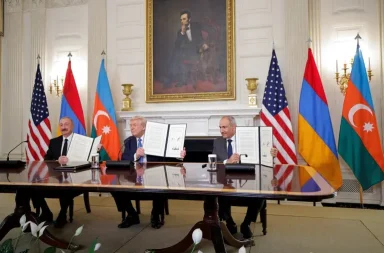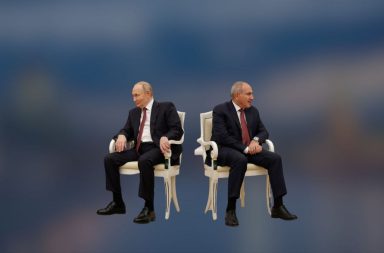by David Bishop
The leader of the “With Honor” (“Pativ Unem Dashink”) parliamentary faction in Armenia, Hayk Mamijanyan, has appealed to the EU’s High Representative for Foreign Affairs, Kaja Kallas, with a request to organize a visit by the EU ambassador in Azerbaijan to Armenian prisoners of war held in Baku. The “I Have Honor” party currently holds six seats in the Armenian National Assembly and is in opposition to the Pashinyan government due to its unsupportive position towards Artsakh, its concessions to Azerbaijan, and its opposition to the Armenian Apostolic Church.
In an update on his Facebook account, Mr. Mamijanyan wrote: “In connection with the closure of the International Committee of the Red Cross office in Azerbaijan, I today sent an official letter to the EU High Representative for Foreign Affairs and Security Policy, Kaja Kalas, and the EU Ambassador to the Republic of Armenia, Vasilis Maragos, requesting that the EU Ambassador to Azerbaijan visit our prisoners held in Baku. In the letter, I spoke about the dangers our compatriots face in the Baku prison, the staged trials, and the importance of such visits from a humanitarian perspective.”
As mentioned by Mamijanyan, this appeal follows Azerbaijan’s recent expulsion of the International Committee of the Red Cross (ICRC) from the country, which effectively eliminated the only channel for humanitarian monitoring of the prisoners’ conditions. International lawyers have repeatedly drawn attention to the plight of Armenian prisoners held by Azerbaijan, which has committed systematic abuse and human rights violations.
Moreover, Mamijanyan outlined the threats faced by Armenians imprisoned in Baku, noting that Azerbaijani authorities have created an “information vacuum” around their situation. With no monitoring or information on their condition at all, there is no way at this time to verify the protection and treatment of Armenia’s prisoners in Azerbaijan’s famously abusive system.
The EU’s response to this request is expected to be highly revealing of its current stance towards Azerbaijan. In April, Kallas visited Baku to discuss further “strengthening of ties.” Just a day before her visit, the EU mission in Armenia deleted the word “genocide” from a social media post commemorating the Armenian Genocide Remembrance Day, reportedly to avoid straining relations with Azerbaijan.
Critics argue that the EU continues to turn a blind eye to the fate of Armenian prisoners of war and other human rights abuses committed by Azerbaijani authorities, prioritizing energy cooperation with Baku and a stronger anti-Russian geopolitical agenda in the region. In such cases, they say, human rights and international law take a back seat to strategic interests. After all, the EU has consistently prioritized conflict with Russia in addition to support for Israel against Iran, and Azerbaijan is strategically located right between Russia and Iran, while providing lucrative energy resources at the same time. It is very unlikely the EU would exert very much pressure on Azerbaijan for the sake of Armenians.
Meanwhile, the Armenian government itself appears reluctant to press for the return of its captured citizens. Observers note that these individuals may be seen as inconvenient witnesses, or even potential political opponents, to Prime Minister Nikol Pashinyan.


